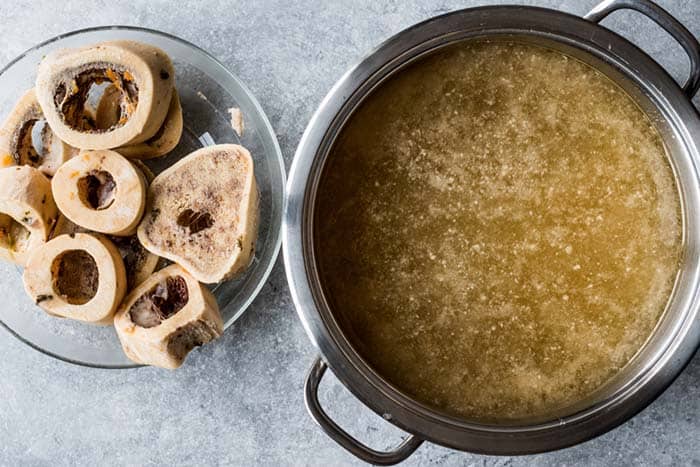Top 7 Benefits of Bone Broth
This post may contain affiliate links which means I may receive a commission for purchases made through links.
Bone broth is connected to a list of important health benefits. Here we will cover the top 7 benefits of consuming bone broth, as well as how to prepare and store it at home. From prehistoric days, bone broth has played a vital role. Anthropologists confirmed that it was a vital tool of early human civilizations.
There are many different types of bone broth used for consumption. Beef bones, chicken bones, and fish bones are most commonly used for bone broth recipes. Bone broth, also known as stock, is a very nutritional liquid/semi-solid substance produced from cooking animal bones and connective tissues under a low temperature for long periods of time.

Most people prepare it as flavors for soups, protein powders, supplements, and even teas. For now, let’s dive into the hype around bone broth.
What Are The Benefits of Bone Broth?
According to recent studies, bone broth has shown positive effects on joint health, digestive health, intestinal health, skin health, and brain health.
The cooking bone broth only takes a few simple steps and may be worth preparing at home. A well-cooked bone broth takes at least 12 hours, while some even take up to 2 days! That’s a considerable amount of time, but the question is, ” is bone broth worth it?” Well, let’s dive deeper into the potential health benefits.
1. Anti-Aging Effects
Eating or drinking bone broth may positively affect your personal aging process. Bone broth is rich in collagen fibers which are a protein component of the cartilage, skin, bones, and nails. The collagen embedded in the bone and connective tissue breaks down into several beneficial amino acids like gelatine, glutamine, and others under heat.
Sipping about 0.3 liters of bone broth can improve the production of collagen from its precursor amino acids like proline and glycine. Clinical studies showed that people who take collagen as a supplement experience improved body elasticity, and hydration, and reduce wrinkles in their skin. In older men and women, collagen helps to improve bone mass density and body composition.

Generally, findings proved that collagen could enhance the body’s lean muscle mass and also help to reduce body fat. As we age, our bones tend to become weaker and more brittle. This is due in part to a decrease in the production of collagen, a protein that helps to keep bones strong and healthy.
However, recent studies have shown that bone broth may help to reverse this process. Regular consumption of bone broth may help to mitigate the effects of aging on bones.
2. Digestion
Bone broth contains a high amount of gelatine. Gelatine combined with water helps to aid the movement of food substances along the digestive tract. Many health researchers suggested that gelatine coupled with other proteins in bone broth can help to heal inflammation in the digestive tract.

3. Immune System
The small intestine is the leading site in the body in which nutrients are absorbed, it is also the major site where the immune system starts functioning. This implies that any damage to the gut area may affect the normal function of the immune system.
Studies have shown that the glutamine and glycine components of the bone broth can effectively improve intestinal barrier function.

4. Joint Health
Clinical trials revealed that osteoarthritis patients who drink bone broth experience pain relief as their joints become less stiff and more functional.
The gelatine component of the meal could help to prevent injuries and improve the tissue repair process. In a study carried out in 2017, gelatine supplements and Vitamin C were capable of repairing torn tendons in the body.

5. Sleep
Bone broth has been gaining popularity in recent years as a health food. It is rich in nutrients and minerals and is said to have a variety of benefits, including improving sleep. While there is no scientific evidence to support this claim, some say that bone broth helps to promote restful sleep by raising levels of glycine.
Glycine is an amino acid that has been shown to improve sleep quality, and it is also found in high levels of bone broth.

In addition, bone broth contains collagen, which is known to support joint health. Collagen has also been linked to better sleep, as it can help to reduce inflammation and promote muscle recovery. For those looking for a natural way to improve their sleep quality, bone broth may be worth a try.
6. Bone Health
The bones and teeth in the body are made up of electrolytes, calcium, phosphorus, and magnesium. These components are richly embedded in a well-cooked bone broth. This means that regular sipping of bone broth could help to fortify and strengthen those bones.
Rich in minerals and collagen, one study found that consumption of bone broth led to increased levels of calcium in the blood and improved bone density in rats. Another study found that chicken soup made with bones contains compounds that can help to inhibit the activity of osteoclasts, cells that break down bone tissue.
So if you’re looking for a way to boost your bone health, consider adding some bone broth to your diet.

7. Stress
There is a special relationship between the brain and the gut, bone broth’s positive effects previously mentioned in the gut are capable of improving an individual’s mood. As you decide what you put in your guy, consider their ability to reduce stress and tension in the body
Anyone who has ever suffered from anxiety or stress knows how difficult it can be to cope with the symptoms. Insomnia, irritability, and fatigue can make it hard to concentrate on work or enjoy time with family and friends. Bone broth has been shown to help reduce stress levels and promote a sense of calm.

The amino acids in bone broth help to support the production of serotonin, which is known as the “happy hormone.” In addition, glycine helps to regulate the body’s stress response. As a result, drinking bone broth regularly can help to keep stress levels in check and promote a sense of well-being.
Storing Broth Broth
A pro tip on storing bone broth in the freezer is to collect it into an ice cube tray, then place it in your freezer. You can store frozen broth in the freezer for about five months, before it may begin to lose its integrity.
You can easily measure frozen broth because each ice cube contains about two tablespoons. You can use large mason glass jars to store your broth to avoid breakage due to liquid expansion while freezing. It’s up to you but when you freeze it, it’s the nutritious gift that keeps on giving.

You May Also Like: Best Water To Drink For Health
Bone Broth And Athletic Performance
For athletes, bone broth provides a unique set of benefits that can help improve performance. First, the high protein content helps to build and repair muscles.
Second, the amino acids in bone broth can help to reduce inflammation. Current research suggests that inflammation is a major factor in fatigue, so reduced inflammation can lead to improved energy levels.
Third, bone broth contains minerals that are essential for electrolyte balance. This is especially important for athletes who sweat heavily, as electrolyte imbalance can lead to cramping and other problems.
Finally, bone broth is easy to digest and provides a fast source of energy. For these reasons, bone broth is becoming an increasingly popular choice for athletes looking to boost their performance.

While more research is needed to substantiate claims regarding bone broth, there is no doubt that bone broth can be a helpful addition to any athlete’s diet.
If you are one that enjoys the further complexities, consider the source of your bone broth, and what that animal may have been eating throughout their life.
Are we eating bone broth from grass-fed ruminants such as cattle, bison, or lamb, or is our bone broth from corn or soy-fed monogastric animals? Before we dive too deep into the complexities of animal protein just remember, you are what you eat, eats.

